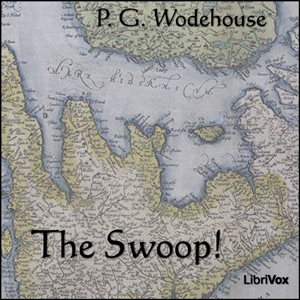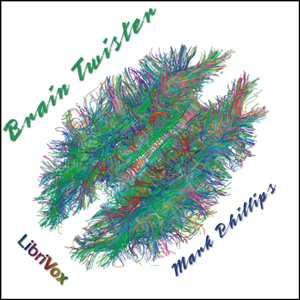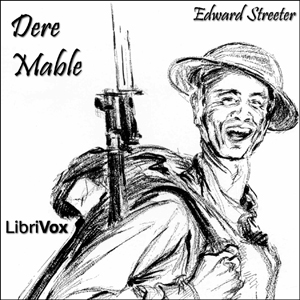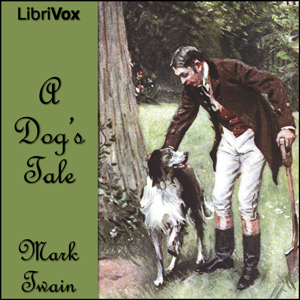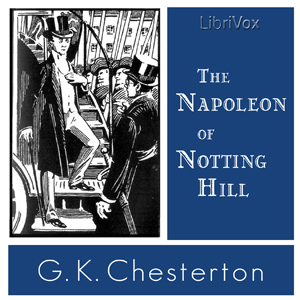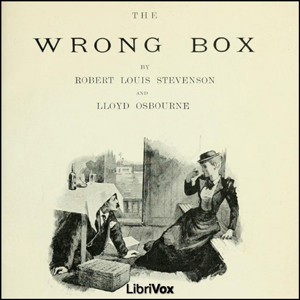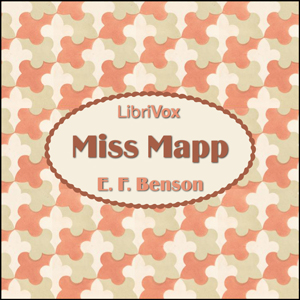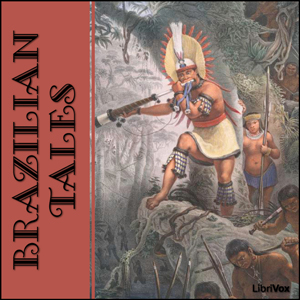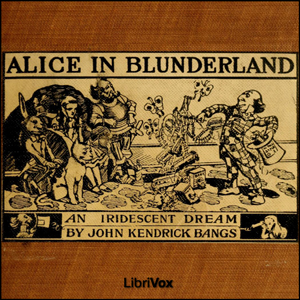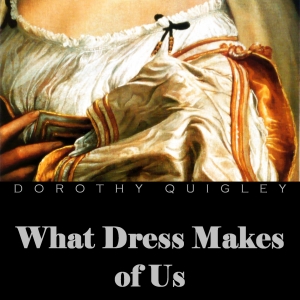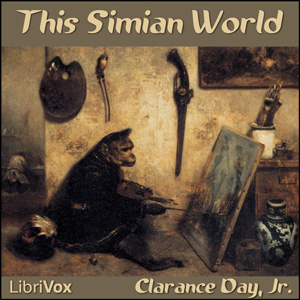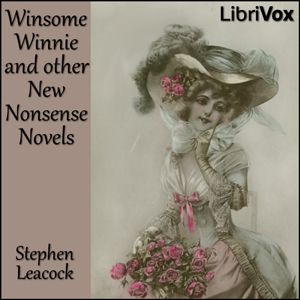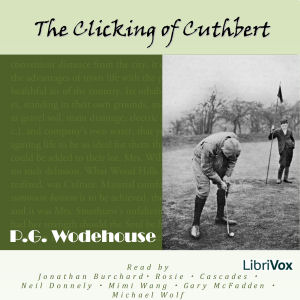The Swoop! tells of the simultaneous invasion of England by several armies — "England was not merely beneath the heel of the invader. It was beneath the heels of nine invaders. There was barely standing-room." (ch. 1) — and features references to many well-known figures of the day, among them the politician Herbert Gladstone, novelist Edgar Wallace, actor-managers Seymour Hicks and George Edwardes, and boxer Bob Fitzsimmons. (Summary from Wikipedia)
17 episodes
Northanger Abbey follows Catherine Morland and family friends Mr. and Mrs. Allen as they visit Bath, England. Seventeen year-old Catherine spends her time visiting newly-made friends, such as Isabella Thorpe, and going to balls. Catherine finds herself pursued by Isabella's brother John Thorpe (Catherine's brother James's friend from university), and by Henry Tilney. She also becomes friends with Eleanor Tilney, Henry's younger sister. Henry captivates her with his view on novels and his knowledge of history and the world. General Tilney (Henry and Eleanor's father) invites Catherine to visit their estate, Northanger Abbey, which, because she has been reading Ann Radcliffe's gothic novel The Mysteries of Udolpho, Catherine expects to be dark, ancient and full of fantastical mystery. (Summary by Wikipedia)
31 episodes
This is the fifth collection of short stories by Saki (H.H. Munro), and was published posthumously in 1923. Even so, many of the stories are quite up to the standard of those collected earlier. (Summary by Graham Redman)
33 episodes
A comic rendering in verse of well-loved Fairy Tales of the Brothers Grimm, each ending with a moral and full of puns. The titles of the tales themselves make another verse.(Summary by Annise)
20 episodes
Emma is a comic novel by Jane Austen, first published in 1816, about the perils of misconstrued romance. The main character, Emma Woodhouse, is described in the opening paragraph as "handsome, clever, and rich" but is also rather spoiled. Prior to starting the novel, Austen wrote, "I am going to take a heroine whom no-one but myself will much like." (Summary by Wikipedia)
55 episodes
"Mark Phillips" is, or are, two writers: Randall Garrett and Laurence M. Janifer. Their joint pen-name, derived from their middle names (Philip and Mark), was coined soon after their original meeting, at a science-fiction convention. Both men were drunk at the time, which explains a good deal, and only one has ever sobered up. A matter for constant contention between the collaborators is which one.Originally published as That Sweet Little Old Lady, Brain Twister follows the adventures of FBI agent Kenneth J. Malone as he attempts to unravel the machinations of a telepathic spy. His first problem: how do you find a telepath to catch the first telepath?The novella was nominated for the Hugo Award in 1960. (Summary from the text and Catharine Eastman)
9 episodes
It wasn't Archie's fault really. It's true he went to America and fell in love with Lucille, the daughter of a millionaire hotel proprietor and if he did marry her--well, what else was there to do?From his point of view, the whole thing was a thoroughly good egg; but Mr. Brewster, his father-in-law, thought differently, Archie had neither money nor occupation, which was distasteful in the eyes of the industrious Mr. Brewster; but the real bar was the fact that he had once adversely criticised one of his hotels. Archie does his best to heal the breach; but, being something of an ass, genus priceless, he finds it almost beyond his powers to placate "the man-eating fish" whom Providence has given him as a father-in-law. (Summary from the Gutenberg text)
26 episodes
A fictitious account of a "friend" of William Shakespeare, who accompanies him from his birth to his death and beyond, chronicling Shakespeare's life, adventures, speeches, and impromptu bursts of poetry. (Summary by Tricia G.)
20 episodes
Bill is in training camp, preparing to go off to World War I. This book is a collection of love letters written to his sweetheart, Mable. The letters are humorous, mis-spelled, and have many stories of life in an army camp - all from Bill's unique perspective. (summary by Rob Kunkel)
6 episodes
Messieurs les ronds-de-cuir, de Georges Courteline, parut, pour la première fois, en feuilleton, dans l'Echo de Paris, au cours des années 1891-1892. Une version légèrement remaniée fut éditée, sous forme de livre, par Flammarion, en 1893. Le livre, constitué d'une suite de cinq tableaux, narre la vie de quelques employés d'un service administratif - celui des Dons et Legs - dont l'activité, suivie pendant quelques jours, dresse, sous le mode de la comédie, une satire féroce du monde des employés de bureau. (par Aldor)
18 episodes

Faces and Places is a collection of articles on nineteenth century travel, events and personalities by the British journalist Henry Lucy, who wrote for the Daily News, a London newspaper. His open letter To Those About to Become Journalists rings as true today as when it was written.The first article, "Fred" Burnaby, includes a lively account of a balloon trip, while Night and Day on the Cars in Canada and Easter on Les Avants relate Lucy's experiences of rail travel at that time. Other travel tales (A Night on a Mountain, Mosquitoes and Monaco, and Oysters and Arcachon) provide an insight into the Victorian Englishman's attitude to Europe.Three of the pieces, With Peggotty and Ham, A Cinque Port and Christmas Eve at Watts's, concern the county of Kent, where Lucy had a country house. Christmas Eve at Watts's contains an interesting exposé of Dickens' short story The Seven Poor Travellers.Other articles are of historical interest: A Wreck in the North Sea is an account of the wreck of the ship "Deutschland" in 1875; A Historic Crowd describes the massive popular interest in the 1871 trial of the Tichborne Claimant; The Battle of Merthyr contains an eye-witness account of the Merthyr Riots of 1831; The Prince of Wales paints a portrait of the future King Edward VII.Lucy, who also wrote as "Toby, M.P." for the satirical magazine Punch, loved to poke gentle fun, particularly at the establishment, and this is especially evident in A Peep at an Old House of Commons and Some Preachers I Have Known.This eclectic collection, mostly affectionately humorous, but with moments of great pathos, was originally published in 1892 in The Whitefriars Library of Wit & Humour.(Summary by Ruth Golding)
17 episodes
This short novel of Twain’s, from 1903, is told from the point of view of a loyal and beloved family pet. Themes of heroics, valor and heart-wrenching tenderness fill this work. The story is also filled with happy events as well as sad ones and is ultimately about what dogs are to us … best friends. A Dog’s Tale is quintessentially Twain. (Summary by Aaron Elliott)
3 episodes
De retour de sa campagne, la Baronne de ... va voir la Marquise de ..., qui n'a plus fermé l'oeil depuis quinze jours. Qu'est-ce qui mieux qu'un discours de l'Abbé pourrait y remédier ? Le voici justement qui se présente. Sans talent pour les réflexions, ce sera par un conte qu'il tentera de les endormir : Riante, la Fée Troisbosses et d'autres seront les héros de son récit cocasse. Que de sottises ! When visiting the Marquise of ..., the Baroness of ... finds her deprived of sleep for a fortnight. Couldn't one of the Abbot's speeches solve this? There he is. He will attempt to put them to sleep by entertaining them with a fairy tale. The heroes of his comical story will be Riante (the Laughing one), la Fée Troisbosses (the Threehumps Fairy) and others. What nonsense ! (Summary by Ezwa.)
11 episodes
While the novel is humorous (one instance has the King sitting on top of an omnibus and speaking to it as to a horse: "Forward, my beauty, my Arab," he said, patting the omnibus encouragingly, "fleetest of all thy bounding tribe"), it is also an adventure story: Chesterton is not afraid to let blood be drawn in his battles, fought with sword and halberd in the London streets, and Wayne thinks up a few ingenious strategies; and, finally, the novel is philosophical, considering the value of one man's actions and the virtue of respect for one's enemies. (Summary from Wikipedia)
16 episodes

« Riquette et Riquet s'aiment, c'est là l'important. Que voudriez-vous savoir de plus ? Comment ils se sont connus ? Où ils se sont rencontrés ? S'ils sont mariés ? S'ils ne le sont pas ? S'ils demeurent ensemble ou s'ils habitent séparément ? Dans quel quartier ? À quel étage ? Quel est le prix de leur loyer ? Comment ils s'habillent ? Ce qu'ils mangent à leurs repas ? etc... etc... L'auteur n'estime pas ces détails indispensables à son récit. Aussi de Riquette et de Riquet il ne vous dira que ceci : Vous voulez les connaître ? Écoutez-les bavarder, rire et s'embrasser. Bavardages, rires et baisers, toute leur histoire tient en ces trois mots que résume cet autre : l'Amour ! » (Extraits) Riquette and Riquet are in love, that's what matters. What else would you like to know? How and where they met? If they are married or not? If they live together or apart? In which neighbourhood? What floor? How much is their rent? How they are dressed? What they eat?... The author does not consider those details necessary to his narrative. Therefore, he won't tell you anything about Riquette and Riquet but this: you'd like to know them? Listen to them chatting, laughing and hugging. Chatter, laughter and hugs, those three words make up their whole story which can be summarized in this other one: Love! (Loose translation by Ezwa)
9 episodes
The Wrong Box is a comedy about the ending of a tontine (a tontine is an arrangement whereby a number of young people subscribe to a fund which is then closed and invested until all but one of the subscribers have died. That last subscriber then receives the whole of the proceeds). The story involves the last two such survivors and their relations, a train crash, missing uncles, surplus dead bodies and innocent bystanders. A farce really. (Summary by AJM)
16 episodes
This romantic comedy stars a young American girl named Sally, who inherits a considerable fortune and finds her life turned upside down. The typically Wodehouseian cast includes Sally's ambitious brother, an assortment of theater people, a pair of English cousins, and, of course, an Uncle. It's jolly good fun! (Summary by Kara and Wikipedia)
18 episodes
E. F. Benson's Mapp and Lucia series, consists of six novels and three short stories. The novels are: Queen Lucia, Lucia in London, Miss Mapp (including the short story The Male Impersonator), Mapp and Lucia, Lucia's Progress (published as The Worshipful Lucia in the U.S.) and Trouble for Lucia.
The novels feature humorous incidents in the lives of (mainly) upper-middle-class British people in the 1920s and 1930s, vying for social prestige and "one-upmanship" in an atmosphere of extreme cultural snobbery. Most of these works are set in the fictional village of "Tilling", which is based on the village of Rye, Sussex, England. "Mallards", the house with the garden room inhabited by Miss Mapp, and later by Lucia, is based on Lamb House, Benson's own home in Rye. Earlier, the house was the Sussex home of writer Henry James. (Summary adapted from Wikipedia by Karen Merline.)
24 episodes
One of the so-called "Chronicles of Carlingford", of which there were two short stories and five novels written from 1861 to 1876 by Margaret Oliphant Wilson Oliphant. The Chronicles originally appeared in the famous Blackwood's Magazine. Mrs. Oliphant wrote prolifically in her career, and many of her main characters were independent, resourceful women. In fact, Miss Marjoribanks has been occasionally cited as the successor to Jane Austen's Emma, albeit Miss Marjoribanks is more focused, less pliable and a decidedly more strategic thinker than dear Emma. (Summary by Michelle Crandall)
53 episodes

Uneasy Money is a romantic comedy by P.G. Wodehouse, published during the First World War, it offers light escapism. More romantic but only a little less humorous that his mature works, it tells of the vicissitudes of poor Lord Dawlish, who inherits five million dollars, but becomes a serially disappointed groom.When the story opens Bill (Lord Dawlish, a thoroughly pleasant man) is engaged to a demanding actress. His first thought when hearing of his massive legacy from a stranger whose tendency to slice he once cured on a West Country golf course is of the disappointed relatives. His trip to the USA attempting to give back the windfall results in complication after complication, including firearms and burglaries as well as the usual human misunderstandings that accompany any human life.Uneasy Money was first published as a serial in the Saturday Evening Post in the USA from December 1915, and in the UK in Strand Magazine starting December 1916. It first appeared in book form on March 17, 1916 by D. Appleton & Co., New York, and later in the UK (on October 4, 1917) by Methuen & Co., London.A silent, black-and-white film version was made in 1918.Summary by Tim Bulkeley based on data from Wikipedia
25 episodes
Mother Goose for Grownups is a delightfully silly collection of parodies on well-known Mother Goose tales by Guy Wetmore Carryl. (Summary by fink)
20 episodes
"Brazilian Tales" is a collection of six short stories selected by Isaac Goldberg as best representative of the Brazilian Literature of his period - the end of the 19th century. His comprehensive preface aims at familiarizing the reader with a literature that was - and still is - virtually unknown outside the boundaries of its own land, and the pieces chosen by Goldberg to be translated belong to writers that reached popularity and appreciation while still alive. This "pioneer volume", as the translator himself puts it, still keeps its charm and interest as a way of offering to the English speaking public some "sample cases" of Brazilian Literature. (Summary by Leni)
7 episodes

If you are expecting glass slippers and pumpkin coaches, look elsewhere... This is "a pantomime as Ibsen would have written it, if only it had occurred to him to write one." Set on a "bleak and cheerless heath overlooking the fjord" we meet Ibsenesque heroine Mrs. Inquest, her step-daughter Hilda, and her daughter Hedda, who is engaged to be married to the unfortunate Tesman. Thus begins Calderon's hilarious Ibsenesque version of Cinderella. NOTE from the editor of the volume, published in 1922 after Calderon's death: This play is hardly more than a rough draft, written when the idea was fresh and put aside to be worked on when the right moment should come. Unhappily it never came; but even in its present form the play has seemed too characteristic of its author to be lost, and it is therefore printed as it stands.
Devotees of Ibsen will recognise many names and references, but may not appreciate Calderon's irreverent parody of the master's work. People who know but do not like Ibsen may well find it very funny. (Summary by Ruth Golding)
Cast list
Mrs. Inquest: Ruth GoldingHedda, her daughter, a distinguished fashionable person: TriciaGHilda, her stepdaughter: Helen TaylorMadam Helseth, her servant: Xe SandsAunt Judy, her sister: Maria KasperMopsyman, Aunt Judy's dog: Clara SnyderStockfish: mbTesman, his son (Acts I and II): David BarnesTesman (Act III): Ian KingA Demon: icyjumboA Fairy: Lucy PerryA Hired Waiter: EzwaAn Italian Waiter: Laurie Anne WaldenA German Waiter: Robert SteinerA Chamberlain: Zames Curran
Stage directions and sound effects: David LawrenceAudio edited by Ruth Golding
4 episodes
Sunshine Sketches of a Little Town is a sequence of stories by Stephen Leacock, first published in 1912. It is generally considered to be one of the most enduring classics of Canadian humorous literature. The fictional setting for these stories is Mariposa, a small town on the shore of Lake Wissanotti. Although drawn from his experiences in Orillia, Ontario, Leacock writes in the introduction: "Mariposa is not a real town. On the contrary, it is about seventy or eighty of them. You may find them all the way from Lake Superior to the sea, with the same square streets and the same maple trees and the same churches and hotels."
This work has remained popular for its universal appeal. Many of the characters, though modelled on townspeople of Orillia, are small town archetypes. Their shortcomings and weaknesses are presented in a humorous but affectionate way. (Summary from Wikipedia)
13 episodes
Premier de l'an, jour si triste pour les uns, si beau pour les autres, je vais essayer d'esquisser ta physionomie ; et je te traiterai aussi bien que possible. Je te redoute trop, moi qui suis une de tes victimes ordinaires, pour ne pas me montrer indulgent envers toi ! Je ne te demande q'une chose, c'est qu'il te plaise de me rendre la pareille. Cher lecteur, puisse mon cadeau du jour de l'an vous plaire ! (Extraits adaptés) First Day of the Year, so sad to some, so lovely to others, I shall attempt to portray you ; and I shall be as gentle as can be. I, one of your usual victims, fear you too much not to be lenient with you! I only ask you for one thing: if you please, do treat me likewise. Dear reader, may you enjoy this New Year's Day present!(Loose translation by Ezwa)
28 episodes
From Alice in Blunderland:
"Certain of our members claim that they have a right to sell their votes for $500 apiece--"
"Mercy!" cried Alice, "Why, that is--that is terrible."
"It certainly is," said the March Hare ruefully, it's rotten. Here I've been holding out for $1,250 for mine, and these duffers want to go in for a cut rate that will absolutely ruin the business."
John Kendrick Bangs takes Carroll's Alice in Wonderland and turns it into a political satire in many ways as fresh, keen and relevant today as it was a hundred years ago. (Summary by Ruth Golding)
7 episodes
Some time after "Three Men in a Boat", George, Harris and Jerome decided to go on a cycling holiday through Germany.This relaxed and gently humorous story of the three friends wandering in and around the Black Forest is coloured by anecdotes, odd tales and Jerome's comments on the German people and their way of life.(Published in 1914. Summary by Peter Yearsley)
14 episodes
A wickedly funny book of advice on women's dress. However old, fat or plain you are, Dorothy Quigley will tell you what not to wear. (Summary by Ruth Golding)
8 episodes
The Europeans: A sketch is a short novel by Henry James, published in 1878. It is essentially a comedy contrasting the behaviour and attitudes of two visitors from Europe with those of their relatives living in the 'new' world of New England. The novel first appeared as a serial in The Atlantic Monthly for July-October, 1878. James made numerous minor revisions for the first book publication. (Summary by Wikipedia)
12 episodes

Adventures of Huckleberry Finn (Tom Sawyer's Comrade), often shortened to Huck Finn, is a novel written by Mark Twain and published in 1884. It is commonly regarded as one of the Great American Novels, and is one of the first major American novels written in the vernacular, characterized by local color regionalism. It is told in the first person by Huckleberry "Huck" Finn, best friend of Tom Sawyer and narrator of two other Twain novels.The book is noted for its colorful description of people and places along the Mississippi River. By satirizing a Southern antebellum society that was already anachronistic at the time, the book is an often scathing look at entrenched attitudes, particularly racism. The drifting journey of Huck and his friend Jim, a runaway slave, down the Mississippi River on their raft may be one of the most enduring images of escape and freedom in all of American literature.The book has been popular with young readers since its publication and is taken as a sequel to The Adventures of Tom Sawyer. It has also been the continued object of study by serious literary critics. The book was criticized upon release because of its coarse language, and became even more controversial in the 20th century because of its perceived use of racial stereotypes and because of its frequent use of the racial slur, "nigger." (Summary by Wikipedia)
43 episodes
Clarence Day, Jr., best known for his work Life with Father, presents a satirical speculation on how the world might be different if we apes had not risen to prominence, but rather one of the other species had become dominant in our place. (summary by Epistomolus)
7 episodes
Eight silly stories by Canadian humourist Stephen Leacock. (Summary by Tricia G)
8 episodes
"And so," the story writers used to say, "they lived happily ever after."Um-m-m—maybe. After the glamour had worn off, and the glass slippers were worn out, did the Prince never find Cinderella's manner redolent of the kitchen hearth; and was it never necessary that he remind her to be more careful of her finger-nails and grammar? After Puss in Boots had won wealth and a wife for his young master did not that gentleman often fume with chagrin because the neighbors, perhaps, refused to call on the lady of the former poor miller's son? It is a great risk to take with one's book-children. These stories make no such promises. They stop just short of the phrase of the old story writers, and end truthfully, thus: And so they lived. E. F. (Summary from the Foreword to "Buttered Side Down")
13 episodes
The necessity of a work on Snobs, demonstrated from History, and proved by felicitous illustrations:—I am the individual destined to write that work—My vocation is announced in terms of great eloquence—I show that the world has been gradually preparing itself for the WORK and the MAN—Snobs are to be studied like other objects of Natural Science, and are a part of the Beautiful (with a large B). They pervade all classes—Affecting instance of Colonel Snobley. (Summary excerpted from Prefatory Remarks from the book by W. M. Thackeray)
46 episodes
Apollonius of Tyre is the subject of an ancient short novella, popular during medieval times. Existing in numerous forms in many languages, the text is thought to be translated from an ancient Greek manuscript, now lost. The earliest manuscripts of the tale, in a Latin version, date from the 9th or 10th century; the most widespread Latin versions are those of Gottfried von Viterbo, who incorporated it into his Pantheon of 1185 as if it were actual history, and a version in the Gesta Romanorum. Shakespeare's play Pericles, Prince of Tyre was based in part on Gower's version, with the change of name probably inspired by Philip Sidney's Arcadia. Apollonius of Tyre was also a source for his plays Twelfth Night and The Comedy of Errors. (Summary by Wikipedia)
3 episodes
The Hunting of the Snark is a long nonsense poem by Lewis Carroll describing the adventures of ten weirdly assorted characters as they pursue an elusive creature known as a snark. (Summary by Shawn Craig Smith)
4 episodes
This is a collection of short (15 minute or less readings) stories suitable for a coffee break at work or a short commuter ride. Emphasis for this collection is Humor in various genres -- fiction and non-fiction. (Summary by BellonaTimes)
25 episodes
As the New York Times said in 1903, this lesser-known work by Jerome K. Jerome does not display "the wit of Congreve or even the glittering sort Mr. Jerome employs in some of his other books."
It takes the form of imaginary conversations between the writer and a number of un-named characters at the afternoon tea table. The Woman of the World, the Old Maid, the Girton Girl, the Philosopher and the Minor Poet wax lyrical on subjects like marriage, art, society and politics. Frequently they appear to prefer the sound of their own voice to that of others.
Although I couldn't agree with the NY Times that it is the Baedeker guide to conversation, it is certainly an eye-opening glimpse into this now almost extinct art. The participants are already bemoaning the lack of invigorating conversation in society: "Conversation has become a chorus; or, as a writer wittily expressed it, the pursuit of the obvious to no conclusion." (Summary by Ruth Golding)
6 episodes
Join the Oldest Member...whether you like it or not...and be carried on a magic carpet ride through the world of golf, love, and...aunts...as seen through the eyes of the creator of Jeeves and Wooster and Blandings Castle, the inimitable Pelham (Plum) Grenville Wodehouse. (Summary by Jonathan Burchard)
11 episodes
A man and his three children leave the “Little Mother” at home in the city and set up temporary housekeeping in a country cottage to supervise the remodeling of the house he has just purchased there. The story is narrated by the father. His interactions with his children, interspersed with his own recollections of past events, make for hilarious reading.This is Jerome at his best, IMHO, although this is apparently one of this lesser known novels.
(Summary by Debra Lynn)
12 episodes
John Kendrick Bangs was an American author and satirist, and the creator of modern Bangasian Fantasy, the school of fantasy writing that sets the plot wholly or partially in the afterlife. (Wikipedia)
Plot summary: J K Bangs has taken Alice from Lewis Carroll's “Alice in Wonderland” and lets her on a boring day travel with the Mad Hatter, the March Hare, the Cheshire Cat and the other of Carroll's familiar characters to Blunderland. The story is a well written Satire, a witty, humorous tale of adventure and city politics, a tale of Alice in a land where nothing is as it should be. (Summary by Lars Rolander)
7 episodes
"Love!--A word by superstition thought a God; by use turned to an humour; by self-will made a flattering madness." - Alexander and Campaspe.
Lady Juliana, the indulged and coddled seventeen ("And a half, papa") year old daughter of the Earl of Cortland, is betrothed by her father to a wealthy old Duke who can give her every luxury. She instead runs away and marries her very handsome but penniless lover. Very soon, they are forced to travel to Scotland to live with his quirky family in a rundown "castle" in the barren wilderness. Can this marriage survive?(Summary by P.Cunningham)
35 episodes
It has been said that behind every successful man is a good woman. This is certainly true in the case of James Orlebar Cloyster. However, some funny things happened on his road to success. His story is humorously told from the point of view of several parties involved.According to Wikipedia, the book is a humorous, fictionalized account of Wodehouse's early years as a journalist, with Wodehouse being portrayed by the character of Cloyster. (Summary by Debra Lynn)
29 episodes
An early, light-hearted short story, published in 1872 by Jules Verne. It takes place in the Flemish town of Quiquendone, where life moves at an extraordinarily tranquil pace. Doctor Ox has offered to light the town with a new gas, but actually has other plans in place. (Summary by Alan Winterrowd)
5 episodes
A book of short stories and humorous anecdotes by Mark Twain, published together in 1906. (Summary by Tricia G)
33 episodes
Merton of the Movies is a comedy that centers around Merton Gill, an aspiring dramatic artist from Simsbury, Illinois who makes his way to Hollywood to become a serious actor. How could Merton fail in attaining his dreams after finishing a correspondence course from the General Film Production Company of Stebbinsville, Arkansas, certifying him to be a competent screen actor?Harry Leon Wilson, the author, was a very popular humor writer in the first decades of the 20th century. This book was made into film several times, the last in 1947 starring Red Skelton. (Summary written by Margaret.)
21 episodes
It is Christmas Eve, and the narrator, his uncle and sundry other local characters are sitting round the fire drinking copious quantities of whisky punch and telling ghost stories until bedtime, when...But no, I won't spoil the fun. This is a little gem: Jerome at his tongue-in-cheek best. (Summary by Ruth Golding)
4 episodes
Artur de Azevedo foi um dos principais autores de teatro no Brasil do século XIX. Dando continuidade à obra de Martins Pena, consolidou a comédia de costumes brasileira, sendo no país o principal autor do teatro de revista, em sua primeira fase. Sua atividade jornalística foi intensa, devendo-se a ele a publicação de uma série de revistas, além da fundação de alguns jornais cariocas. Ficou também conhecido por suas crônicas e contos, sempre cheios de humor. Esta coleção éuma recolha de seus contos, publicados, em sua maior parte, no livro Contos Possíveis, de 1908. (Sumário adaptado da Wikipedia por Leni)
20 episodes
Artur de Azevedo foi um dos principais autores de teatro no Brasil do século XIX. Dando continuidade à obra de Martins Pena, consolidou a comédia de costumes brasileira, sendo no país o principal autor do teatro de revista, em sua primeira fase. Sua atividade jornalística foi intensa, devendo-se a ele a publicação de uma série de revistas, além da fundação de alguns jornais cariocas. Ficou também conhecido por suas crônicas e contos, sempre cheios de humor. Este é o segundo volume da coleção de Contos de Artur Azevedo, criada pelos voluntários do LibriVox. (Sumário adaptado da Wikipedia por Leni)
20 episodes
This collection of 63 writings by Mark Twain was published in 1875. Among other sketches, it contains "The Jumping Frog" in the original English, followed by a French translation (read here by Caroline Mittler) which Twain re-translated into English, showing how the French translation of his work was "badly flawed." In many of these sketches, Twain shows his talent for outrageous and hilarious inventiveness, often in reaction to current events. (Summary by John Greenman)
64 episodes
